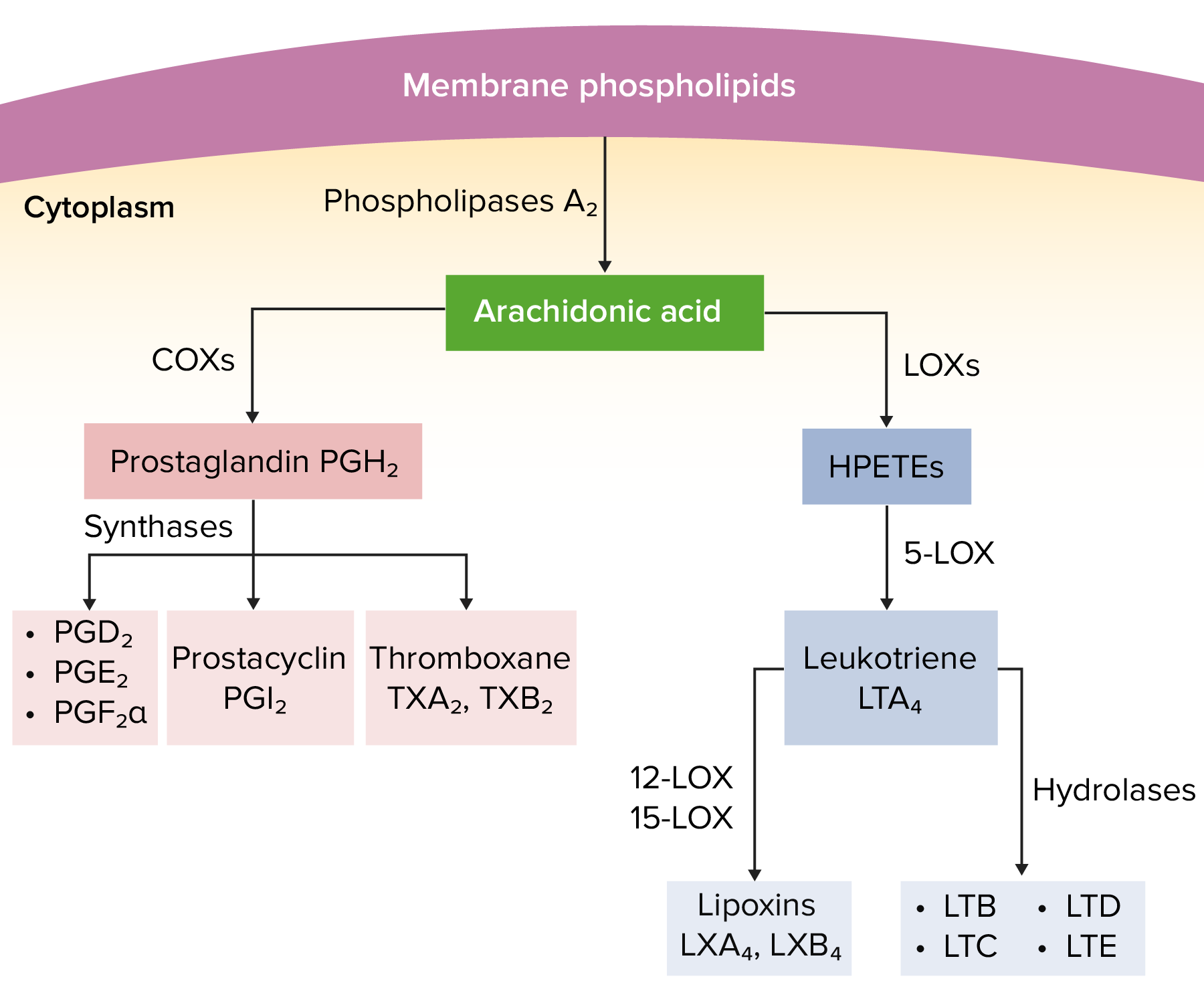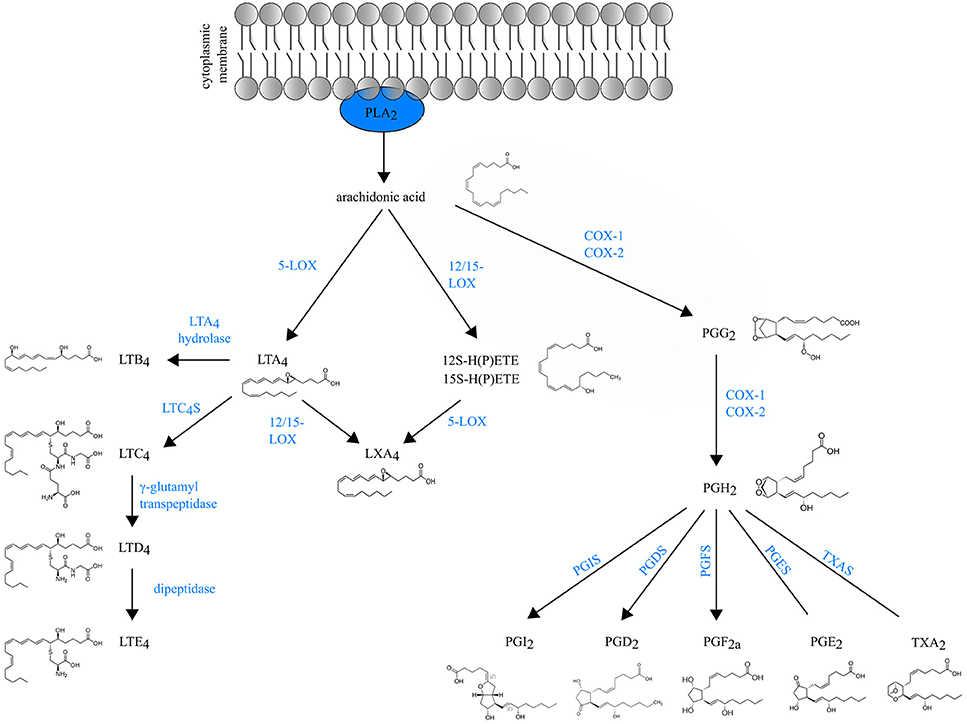Playlist
Show Playlist
Hide Playlist
Inflammation Pharmacology Questions
-
Slides Inflammation Pharmacology Questions.pdf
-
Reference List Pharmacology.pdf
-
Download Lecture Overview
00:01 Let's do some questions. The first question. The Correct Answer is D. Indomethacin is a nonsteroidal anti-inflammatory drug (NSAID) known for its potent anti-inflammatory, analgesic, and antipyretic effects. 00:20 Its primary mechanism of action involves the reversible inhibition of the cyclooxygenase enzymes, COX-1 and COX-2. This inhibition reduces the synthesis of prostaglandins, which are lipid compounds that play a key role in inflammation, pain, and fever. 00:39 By decreasing prostaglandin production, indomethacin effectively reduces the pain and swelling associated with acute gout attacks. 00:47 Given its potency and efficacy, indomethacin is often prescribed for short-term use during acute flare-ups . 00:54 The first line therapy for an acute gout flare is intraarticular glucocorticoids,such as triamcinolone. 01:01 Such treatment is highly effective with a single dose and avoids complications associated with systemic therapy. 01:08 When intraarticular glucocorticoids are not available, then there are 3 other choices, consisting of giving systemic nonsteroidal anti-inflammatory drugs, such as indomethacin or naproxen, or administering oral colchicine or oral glucocorticoids. 01:26 Keep in mind that the FDA has issued a boxed warning for all NSAIDS because of the risk of serious cardiovascular thrombotic events, as well as serious gastrointestinal bleeding, ulceration, and perforation. Thrombosis, including venous thromboembolism, tends to occur early in the treatment with NSAIDs and is dose-dependent. 01:47 NSAIDs reduce the production of prostacyclin without significantly affecting thromboxane A2 levels. This imbalance leads to a prothrombotic state, increasing the risk of arterial thrombosis, MI, and stroke. Additionally, NSAIDs can cause hypertension and exacerbate heart failure by promoting fluid retention and increasing systemic vascular resistance. 02:10 The risk is dose- dependent. The chemical structure of indomethacin is shown, as well as that of aspirin for comparison. 02:17 Remember that aspirin is an irreversible inhibitor of COX-1 and COX-2, unlike other NSAIDS. 02:23 Answer opinion A is incorrect because indomethacin is a non-selective inhibitor of both COX-1 and COX-2 enzymes Selective COX-2 inhibitors, such as celecoxib and etoricoxib, primarily target the COX-2 enzyme with minimal effects on COX-1 This selectivity helps to reduce gastrointestinal side effects, as COX-1 is involved in protecting the stomach lining. 02:48 Answer B is wrong because xanthine oxidase inhibitors, such as allopurinol and febuxostat, work by reducing uric acid production. They inhibit the enzyme xanthine oxidase, which is responsible for converting hypoxanthine to xanthine and xanthine to uric acid. these medications are used for long-term management and prevention of gout by lowering serum uric acid levels, but are not effective for treating acute inflammatory episodes. 03:15 Answer C is incorrect, because indomethacin is a non-selective inhibitor of cyclooxygenase. 03:22 Several COX-1 selective inhibitors, such as mofezolac, have been clinically used as an analgesic. 03:29 Others have shown potential in the treatment of certain cancers, neuroinflammation, and cardiovascular diseases. 03:36 Let's go on to question number 2. A 66 year old woman has been placed on methotrexate 7.5 mg once a week. 03:46 She also has folic acid supplementation. Methotrexate works by the following mechanism in rheumatoid arthritis. 03:54 A, inhibition of folate kinase to increase the free pool of folic acid. 04:01 B, inhibition of dihydrofolate reductase to reduce the free pool of folic acid. 04:09 C, inhibition of folic synthase to reduce the free pool of folic acid. 04:14 Or D, inhibition of folic reductase to reduce the pool of folic acid? Good. This is a hard question. But remember that methotrexate inhibits dihydrofolic acid reductase and that reduces the free pool of folic acid. 04:38 Let's do another question. Aspirin is unique among the nonsteroidal anti-inflammatory agents because. 04:46 A, it is an irreversible binder to cyclooxygenase. B, it is specific to the COX-2 form. 04:53 C, it is a suicide inhibitor of xanthine oxidase. And D, it is a reversible inhibitor of dihydrofolate reductase. 05:03 Good, you chose irreversible binder. Remember that the other nonsteroidal anti-inflammatory agents are reversible, Aspirin is irreversible. 05:12 So, the only way that you can get reversal of the effects of Aspirin is by waiting for the platelets that are affected or the agents that are affected to die off. 05:24 That's it. You've done very well to sit through this lecture. I think that you're going to do very well on your exams. 05:30 Good luck.
About the Lecture
The lecture Inflammation Pharmacology Questions by Pravin Shukle, MD is from the course Inflammation Pharmacology.
Included Quiz Questions
Which of the following pairings is correct?
- Methotrexate Dihydrofolate reductase inhibitor
- Rasburicase Xanthine oxidase inhibitor
- Cyclophosphamide Calcineurin inhibitor
- Azathioprine Pyrimidine analogue
- Cyclosporine Alkylating agent
Which of the following statements regarding aspirin is correct?
- It irreversibly inhibits the cyclooxygenase enzyme required for prostaglandin and thromboxane synthesis.
- It should not be given to anyone older than 12 years who has a fever because of its association with Reye syndrome.
- It selectively inhibits cyclooxygenase activities in the brain.
- People with hyperuricemia should take aspirin because it enhances the kidney's ability to excrete uric acid.
Customer reviews
5,0 of 5 stars
| 5 Stars |
|
1 |
| 4 Stars |
|
0 |
| 3 Stars |
|
0 |
| 2 Stars |
|
0 |
| 1 Star |
|
0 |
The best lecture and teacher. I like it very much. Grettings.





